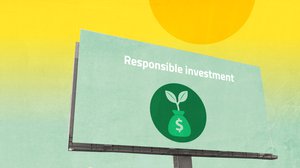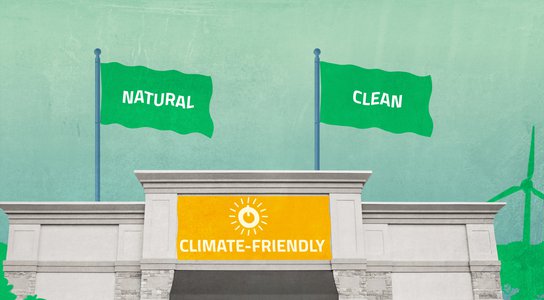As the climate crisis deepens, all eyes are on the fossil fuel industry. With pressure building, these profiteers of climate breakdown have shifted from denying science to peddling false solutions to delay action.
After decades of disinformation and denial from the fossil fuel industry, demands for climate action are growing.
In the United States, a record number of citizens are now alarmed or concerned, while in the UK 75% of adults worry about climate change. A poll commissioned by Global Witness showed that two-thirds of the British public wants climate leadership and a recent global UN survey showed overwhelming support for climate action.
This growing movement has grounded itself in climate justice thanks to the leadership of activists and communities, particularly from the Global South, centering Earth defenders and their rights.
Dangerous trade-offs
There is a global scientific and political consensus on the need for action. In response, the number of net zero targets and promises of carbon neutrality has exploded with ever more companies showing off their ‘climate credentials’. But many so-called solutions to the climate crisis benefit some of the biggest polluters and involve dangerous “trade-offs” for people and the planet.
1. Carbon offsetting vs the rights of Indigenous and traditional communities
In the Peruvian Amazon, the Indigenous Kichwa community has taken the Peruvian state and the Cordillera Azul National Park to court, claiming that their rights have been violated in the name of a REDD+ project (Reducing Emissions from Deforestation and Forest Degradation) in the Cordillera Azul.
The Ethnic Council of the Kichwa Peoples of the Amazon challenged the state and national park for not titling their traditional lands, imposing exclusionary conservation, and selling carbon credits without their consent. After the lawsuit launched, there were reports that $87 million in credits were sold in a single transaction to an unnamed “international extractive company”.
“The State frequently grants rights to third-parties without even consulting our Indigenous communities and organisations, it does as it likes with Indigenous territories, but we the Kichwa are the ones caring for the forests” states Isidro Sangama, vice-president of CEPKA in a press release.
Indigenous Peoples safeguard 80% of the world’s biodiversity but developers are intent on profiting from that to generate offsets for fossil fuel giants.
The Cordillera Azul REDD+ project is trumpeted by fossil giants Shell and Repsol as making a positive impact on people and the planet. The companies market these offsets to their customers through Shell’s Drive Carbon Neutral campaign and Repsol’s Waylet platform.
Most of the land targeted for carbon projects overlaps with areas held or in contestation by Indigenous, local, and Afro-descendant peoples. This makes it is likely that an avalanche of land-grabs will ensue in what some have called a ‘Carbon Heist’.
2. Net zero plans vs global food security
To align with the science, net zero plans must prioritize decarbonization. However, the net zero plans of some of the biggest emitters require extensive swathes of land to soak up rising emissions. Oxfam highlights that the fossil fuel industry alone could require 500 million hectares of land to offset their emissions by 2050 to reach net zero. This accounts for around one third of global cropland which could drive up food prices, leaving millions if not billions of people in famine.
3. The right to pollute vs global ecosystems
Solely using ecosystems to soak up continued emissions is flawed, because ecosystems cannot mitigate climate change if we overshoot 1.5 degrees of warming. Warming turns ecosystems into sources of CO2, as is already happening with the Amazon. Carbon offset projects used by bp and Microsoft are already burning in forest fires. Using nature to offset climate change is senseless if we do not wean the global economy off fossil fuels now.
4. Burning trees or crops for energy vs water security
Bioenergy with Carbon Capture and Storage (BECCS) has consistently been exposed for its negative climate impacts. What is often overlooked are its impacts on water. A recent study showed the immense level of water stress that a large-scale BECCS deployment would have: it would double water stress and be even worse than if driven by climate change.
This is just a snapshot of the devastating impacts of these so-called climate solutions. These are not only “trade-offs” but rights violations, famine, ecosystem loss and water scarcity, which could mean death sentences, especially for some of the most marginalized communities globally.

Fossil fuel interests vs climate justice
Fossil fuel companies and their supporters seem to forget, ignore or disregard a key principle of climate justice:
The violence of the climate crisis disproportionately falls on populations which have been made vulnerable for generations. The roots of this injustice can be found in unequal power relations of European colonialism. By continuing to extract and burn climate wrecking fossil fuels, these companies are profiting from this injustice. Meanwhile, the industry has spend billions on advertisements to greenwash their reputations and continue with business as usual.
These false climate solutions could lead to an increase in emissions and deepen injustice. What’s worse, they could turn into a profit-making circus to the benefit of the fossil fuel industry.
The climate crisis - a super wicked problem
There is not one silver bullet to the climate crisis, because it is a super wicked problem. We must be prepared to counter false climate solutions with evidence and community engagement.
Super wicked problems are defined as problems whose:
- Causes are many and complex
- Impacts have high degrees of uncertainty and are interrelated
- Solutions may cause further problems
We must ask each other: how do we ensure that solutions are based on climate justice? We can begin by holding actors accountable based on three non-exhaustive, interrelated signposts:
- Human rights
- Scientific robustness
- Democracy
By measuring proposed climate solutions against these, we can ensure support for solutions that transform our societies. If done right, our climate mitigation and adaptation strategies can help to build a more just, sustainable, and democratic world.
Author
-
Sara Cordovez López
Intern, Corporate Accountability


![VCMIsimple4[60].png](https://cdn2.globalwitness.org/media/images/VCMIsimple460.2e16d0ba.fill-544x300.png)